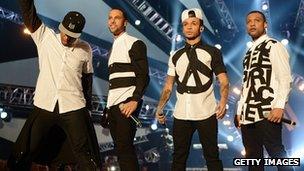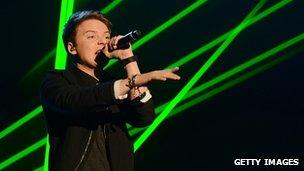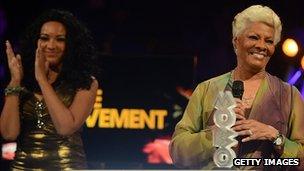Mobo Awards: Emeli Sande scoops three prizes
- Published
Singer Emeli Sande was the big winner at the Mobo Awards, taking three prizes at the music ceremony in Liverpool.
Sande won best album for Our Version of Events, best female and best R&B/soul.
The prizes cap a breakthrough year in which the star performed at the Olympic opening and closing ceremonies. She also has the UK's best selling album of 2012 so far.
East London singer and rapper Plan B won two prizes at the 17th Music of Black Origin ceremony.
The best male and best hip-hop/grime artist awards were reward for the critical and commercial success of his third album Ill Manors.
The Mobo Awards were established in 1996 to champion artists that were under-represented in the mainstream.
But with thousands of teenage fans letting out ear-splitting screams for their idols on the red carpet and inside the Echo Arena, Mobo artists now dominate the pop music world.
Boy band JLS provoked a high-pitched frenzy on the red carpet before winning the prize for best video during the ceremony for Do You Feel What I Feel?
There were also screams and chants for Kosovo-born, London-raised pop star Rita Ora, whose three UK number one singles this year helped her to the best newcomer crown.
Labrinth, who rose to fame as a producer and writer for Tinie Tempah, was another popular winner, picking up the best song trophy for Earthquake, his hit collaboration with the rapper.

JLS performed at the ceremony as well as winning the fifth Mobo Award of their careers
He confirmed his transition to star status with a performance that saw him begin by playing a grand piano and end by wielding a guitar in front of banks of pyrotechnics.
Labrinth is currently number one in the UK singles chart with a collaboration with Emeli Sande.
Sande, a Scottish former medical student, returned to the Mobos three years after making her TV debut at the event.
After scooping her hat-trick on Saturday, she said: "I really didn't expect to get three. I feel fantastic, I feel like all the hard work pays off when you get acknowledgement like this, so I'm very happy."
Colourful US rapper Nicki Minaj was named best international act, while Sean Paul won the reggae prize and Zoe Rahman picked up the award for best jazz act.
Nigerian singer-songwriter D'Banj was named best African act and the award for best gospel artist went to Birmingham's Rachel Kerr.

Conor Maynard, who was up for best newcomer, said he had been heavily influenced by black artists
The surviving members of US R&B group TLC travelled to receive the outstanding contribution to music honour a decade after their bandmate Lisa "Left Eye" Lopes was killed in a car crash.
And pop legend Dionne Warwick was bestowed with the Mobo lifetime achievement award.
Other Mobo nominees ranged from hip-hop acts like Wiley and Professor Green to artists whose music is less obviously of black origin, such as singer-songwriter Ed Sheeran and teenage pop star Conor Maynard.
But Maynard said: "I grew up listening to people like Michael Jackson and Stevie Wonder and a lot of my musical influences are black artists."
JLS heartthrob Jonathan "JB" Gill said a lot had changed in the charts in recent years. "I don't think that music of black origin is any longer unrepresented," he told BBC News.
"A few years ago guys like Wiley and Dizzee Rascal might not have been recognised, now they're getting to number one. That's an incredible step for music of black origin and the Mobo Awards. They're definitely starting to put a lot of artists on the map."

Dionne Warwick (right, pictured with Mobo founder Kanya King), said the night had been "interesting"
But Mobo founder Kanya King rejected the suggestion that the Mobos' mission was now complete.
"The gospel winner, the jazz winner - where else are they going to get a platform?" she said. "Who else is going to champion them?
"And it's amazing to have someone like Dionne Warwick on the same stage as some of the up-and-coming stars. It helps to bring it to a global audience. Our work is never done."
Warwick, known for hits like Heartbreaker and Walk On By, said that without black music, "you wouldn't have any music".
But asked what she thought of the current crop of artists she had seen perform at the ceremony, she replied: "It's been, er, interesting."
Emeli Sande was "wonderful", the 71-year-old said, but added that modern pop was "not for my ears - it's for younger ears".
- Published28 October 2012